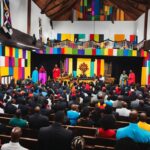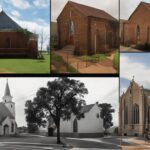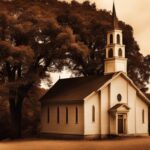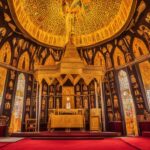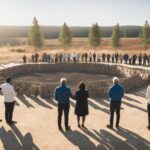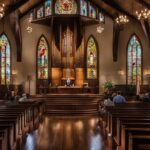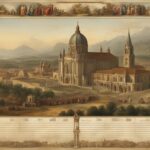The Black Church in America has a deep and storied history that spans over 400 years. It is a testament to the faith, resilience, and community spirit of African Americans. From its origins in the trans-Atlantic slave trade to its continued influence in modern society, the Black Church has played a vital role in African American religious history and is a symbol of hope and empowerment.
The Black Church: This Is Our Story, This Is Our Song is a groundbreaking documentary series that delves into the 400-year-old history of the Black church in America. It explores how African people brought their faith traditions from Africa to the New World and transformed them into a unique form of Christianity that became their own.
Throughout the centuries, the Black Church has been a source of strength and resilience for African Americans. It has provided a safe space for worship, community-building, and social activism. Black Church leaders have been at the forefront of movements for civil rights and social justice, shaping the course of American history.
Key Takeaways:
- The Black Church has a rich history that spans over 400 years in America.
- The Black Church originated from the faith practices of enslaved Africans during the trans-Atlantic slave trade.
- Key beliefs and doctrines of the Black Church include communal worship, spiritual healing, and a strong emphasis on social justice.
- The Black Church has played a significant role in American history, serving as a center for worship, community organizing, and social activism.
- There are various denominations and schisms within the Black Church, resulting from theological differences and leadership disputes.
Origins and Founders of the Black Church
The Black Church in America has its roots in the trans-Atlantic slave trade. Enslaved Africans brought their faith traditions from Africa to the New World and found solace and strength in their spirituality. Despite the horrors of slavery, African Americans clung to their faith and adapted their religious practices to fit their new circumstances.
The Black Church was founded by courageous African American leaders who recognized the need for a space of worship and community-building. These individuals, often working against tremendous odds, established churches and religious institutions to provide spiritual guidance and support to their communities. They became the spiritual leaders and pastors of these churches, leading their congregations in worship and fostering a sense of belonging and identity.
“The Black Church has its foundations in the faith of enslaved Africans and the resilience of African American leaders who defied oppressive systems to create a space of worship and empowerment.”
The founders of the Black Church were trailblazers who paved the way for the growth and development of African American faith traditions. Through their efforts, the Black Church became a symbol of hope, resistance, and resilience, providing a sanctuary for worship, fellowship, and social activism.
Table: Key Founders of the Black Church
| Name | Denomination/Church | Significance |
|---|---|---|
| Richard Allen | African Methodist Episcopal (AME) Church | Founded the first independent Black denomination in the United States |
| Absalom Jones | African Episcopal Church of St. Thomas | One of the first African American priests ordained in the Episcopal Church |
| Charles Harrison Mason | Church of God in Christ (COGIC) | Established one of the largest Pentecostal denominations in the world |
Key Beliefs and Doctrines of the Black Church
The Black Church, rooted in African American religious practices, holds a set of key beliefs and doctrines that shape its identity and guide its followers. These beliefs combine elements of African spirituality with Christian teachings, creating a unique and powerful faith tradition.
Beliefs:
- The importance of faith: The Black Church emphasizes the significance of having faith in God and trusting in His power to bring about change in individuals and communities.
- The power of prayer: Prayer is seen as a direct line of communication with God, and the Black Church encourages its members to pray fervently for guidance, healing, and deliverance.
- The presence of the Holy Spirit: The Black Church believes in the active presence of the Holy Spirit in the worship experience, recognizing the Spirit’s role in inspiring and empowering believers.
- The liberation of the oppressed: Rooted in the experience of slavery and racial injustice, the Black Church emphasizes the liberation of the oppressed as a central tenet of its faith, calling for social justice and equality.
- The authority of the Bible: The Bible is regarded as the inspired word of God and serves as a guide for daily living, offering wisdom, comfort, and moral teachings.
Doctrines:
- Salvation through Jesus Christ: The Black Church upholds the belief that salvation is achieved through faith in Jesus Christ and the acceptance of His redemptive work on the cross.
- The priesthood of all believers: Every member of the Black Church is considered a priest and has a direct relationship with God, allowing for personal spiritual growth and ministry.
- The importance of community: The Black Church values communal worship and fellowship, recognizing the power of coming together as a community to support, encourage, and uplift one another.
- Social engagement: The Black Church advocates for social engagement and active participation in efforts to address societal issues, seeking to bring about positive change and uplift marginalized communities.
- Eternal life: The Black Church believes in the promise of eternal life through faith in Jesus Christ, affirming the hope of a future beyond the earthly realm.
The Black Church’s key beliefs and doctrines reflect its rich heritage and commitment to faith, justice, and community. These principles have guided African American religious practices for centuries, shaping the identity and impact of the Black Church in America.
Historical Significance of the Black Church
The Black Church holds immense historical significance in the United States, playing a pivotal role in shaping the nation’s history. From its earliest beginnings during the period of slavery, the Black Church emerged as a symbol of hope, empowerment, and resilience for African Americans. It served as a sanctuary where enslaved individuals could openly express their faith, find solace, and build a sense of community.
During the era of Jim Crow segregation, the Black Church continued to be a beacon of light, providing not only spiritual guidance but also serving as a center for social and political organizing. It became a vital force in the Civil Rights Movement, with influential leaders such as Martin Luther King Jr. and Rosa Parks emerging from within the Black Church community. The Black Church played an instrumental role in organizing protests, mobilizing communities, and advocating for racial equality and justice.
Today, the Black Church remains an influential institution, addressing the contemporary issues faced by African Americans. It continues to provide spiritual guidance, promoting social justice, community development, and empowerment. Through its various denominations and independent congregations, the Black Church continues to be a source of strength and resilience, while also shaping the course of American history.
| Impact of the Black Church | Role of the Black Church in American History |
|---|---|
| The Black Church has been a source of strength and resilience for African Americans throughout history. | The Black Church has played a vital role in the fight for civil rights and social justice. |
| It has provided a safe space for worship, community organizing, and social activism. | Black Church leaders have been at the forefront of movements for equality and liberation. |
| The Black Church has been instrumental in shaping the course of American history, advocating for change, and addressing the needs of marginalized communities. | The Black Church has contributed to the development of African American religious traditions and cultural identity. |
Denominational Split or Schisms within the Black Church
The Black Church is a diverse and vibrant community, comprising various denominations and independent congregations. Over the years, the Black Church has experienced denominational splits and schisms, resulting in the formation of different religious groups within the African American community. These divisions often stem from theological differences, varying interpretations of scripture, or disagreements over leadership and governance.
One notable example of a denominational split within the Black Church is the division between the National Baptist Convention, USA, Inc. (NBC) and the Progressive National Baptist Convention, Inc. (PNBC). The split occurred in 1961 when a group of pastors and leaders sought a more proactive stance on civil rights issues, leading to the formation of the PNBC. Today, both organizations continue to thrive and serve their respective communities.
Another significant schism within the Black Church is the split between the African Methodist Episcopal Church (AME) and the African Methodist Episcopal Zion Church (AME Zion). This division originated in the early 1800s due to disagreements over the autonomy of the church and the role of bishops. As a result, the AME Zion Church was established as an independent denomination, while the AME Church remained autonomous. Both denominations play integral roles in the Black Church today.
Table: Denominational Splits within the Black Church
| Denomination | Date of Split | Reason for Split |
|---|---|---|
| National Baptist Convention, USA, Inc. (NBC) | 1961 | Proactive stance on civil rights issues |
| Progressive National Baptist Convention, Inc. (PNBC) | 1961 | Seeking a more proactive stance on civil rights issues |
| African Methodist Episcopal Church (AME) | 1816 | Disagreements over the autonomy of the church and the role of bishops |
| African Methodist Episcopal Zion Church (AME Zion) | 1821 | Disagreements over the autonomy of the church and the role of bishops |
These denominational splits and schisms within the Black Church reflect the diverse perspectives and theological interpretations among African American Christians. Despite these divisions, the Black Church remains a unifying force within the African American community, providing spiritual guidance, community support, and a platform for social activism.
Leadership and Governance in the Black Church
The Black Church is a dynamic institution led by pastors and ministers who play a crucial role in providing spiritual guidance, fostering community development, and leading social justice initiatives. Black Church leaders are highly respected figures within their congregations and are responsible for both the spiritual and practical aspects of church governance. They navigate the challenges of leading a diverse and vibrant community while upholding the traditions and values of the Black Church.
One key aspect of Black Church leadership is the emphasis on servant leadership, where pastors and ministers see themselves as humble servants of God and the community. They are called to serve their congregation, providing guidance, support, and nurturing spiritual growth. Black Church leaders often have a deep understanding of the historical and cultural significance of the Black Church, which informs their leadership style and approach.
The governance structure of the Black Church varies across different denominations and churches. Some have a hierarchical structure, with bishops or overseers overseeing multiple churches, while others have a more congregational model, where decisions are made collectively by the members. Regardless of the specific structure, Black Church governance typically involves a combination of clergy and laity leadership, ensuring that the voices and perspectives of the congregation are represented.
The Role of Black Church Leaders in Social Justice
Black Church leaders have historically been at the forefront of social justice movements, advocating for equality, civil rights, and racial justice. Their leadership has been instrumental in shaping the course of American history. Through sermons, activism, and community organizing, Black Church leaders have played a vital role in addressing issues of systemic racism, poverty, education, criminal justice reform, and healthcare disparities.
“The Black Church has always been a sanctuary for our people, providing not only spiritual nourishment but also a platform for community organizing and social change,” says Reverend James Carter, pastor of Hope Community Church in Atlanta.
Black Church leaders often draw inspiration from the legacy of early pioneers such as Bishop Richard Allen, founder of the African Methodist Episcopal Church, and Reverend Martin Luther King Jr., a prominent figure in the Civil Rights Movement. Their commitment to justice and equality continues to influence Black Church leaders today, driving them to be agents of change within their communities and beyond.
Table: Black Church Leadership Roles
| Leadership Roles | Description |
|---|---|
| Pastor | The spiritual leader of the church who provides pastoral care, delivers sermons, and guides the congregation in their faith journey. |
| Minister | An ordained individual who assists the pastor in carrying out the various ministries and services of the church. |
| Deacon | A servant leader responsible for assisting with the practical needs of the congregation, such as visitation, charity work, and administrative tasks. |
| Trustee | Members who oversee the financial and legal affairs of the church, ensuring responsible stewardship of resources. |
| Lay Leader | A representative of the congregation who serves as a liaison between the laity and clergy, voicing the concerns and aspirations of the congregation. |
Worship Practices in the Black Church
The worship practices within the Black Church are deeply rooted in African American traditions and culture. They reflect the vibrant and dynamic expressions of faith that have been passed down through generations. Central to Black Church worship is the powerful use of music, which plays a transformative role in the worship experience.
“Music is the heart and soul of the Black Church,” says Reverend James Thompson, a pastor at a historic Black Church in Mississippi. “It brings people together, uplifts the spirit, and allows us to connect with the divine. Gospel music, spirituals, and hymns are all integral parts of our worship services.”
“When I hear the voices of the choir and feel the energy of the congregation, it’s like heaven on earth,”
says Sarah Johnson, a member of a Black Church in Atlanta. “There’s nothing like the sound of a hundred voices singing praises to God.”
Not only does music foster a sense of unity and joy, but it also serves as a form of spiritual expression and solace. The rhythmic beats, soulful melodies, and heartfelt lyrics provide a platform for worshippers to connect with their innermost emotions and connect with the divine.
Traditional Worship Elements
In addition to music, Black Church worship incorporates other elements that contribute to its unique character. Call and response is a common practice, where the preacher or choir leader initiates a line or phrase, and the congregation responds in unison. This interactive style of worship creates a sense of participation and engagement among the worshippers.
Another prominent aspect of Black Church worship is the power of preaching. Sermons in the Black Church are known for their passionate delivery, rhythmic cadence, and ability to inspire and motivate. The preacher often draws on biblical teachings and African American history to convey messages of hope, liberation, and social justice.
Overall, worship in the Black Church is a celebration of faith, community, and spiritual well-being. It is an experience that nourishes the soul, uplifts the spirit, and strengthens the bonds of fellowship.
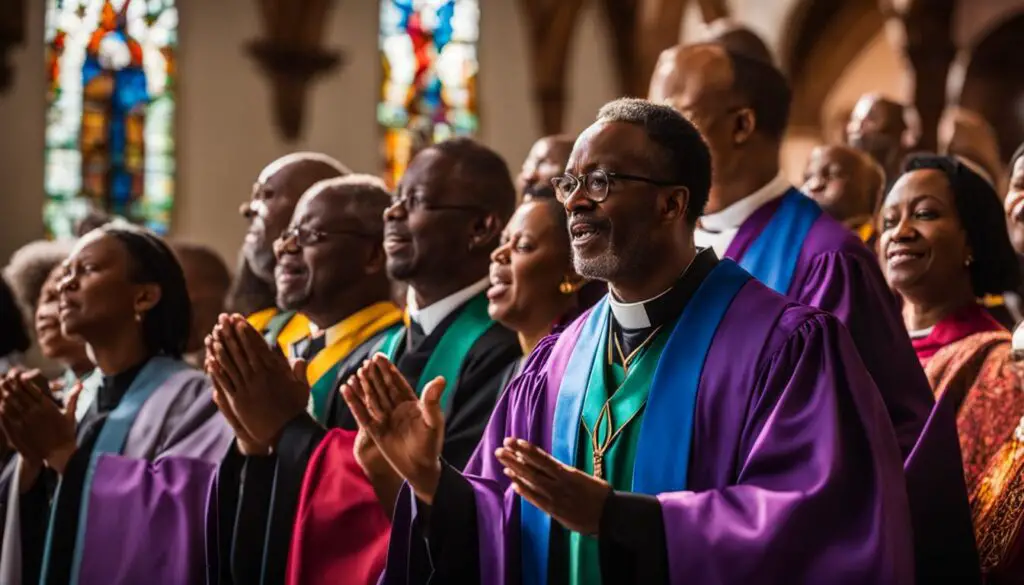
Contemporary Influence of the Black Church
The Black Church continues to have a significant influence on African American communities and modern society as a whole. Its role goes beyond spiritual guidance and encompasses various aspects of social, cultural, and political life. The Black Church serves as a center for empowerment, community organizing, and social services, addressing the unique needs of African American communities.
One of the primary ways in which the Black Church impacts African American communities is through its emphasis on social justice. The Black Church has a long history of advocating for civil rights and equality. It played a pivotal role in the Civil Rights Movement of the 1950s and 1960s, providing a platform for leaders such as Martin Luther King Jr. and Rosa Parks to mobilize and inspire change. Today, the Black Church continues to address issues such as poverty, education, healthcare disparities, and systemic racism, working towards a more equitable society.
In addition to its social activism, the Black Church also plays a vital role in providing essential services to its congregation and the wider community. Many Black churches offer programs and initiatives that aim to uplift and support individuals and families. These include educational initiatives, job training programs, healthcare services, and assistance with housing and food insecurity. The Black Church recognizes the interconnectedness of spiritual and physical well-being, actively working towards the betterment of African American communities.
| Role of the Black Church in Modern Society | Impact of the Black Church on African American Communities |
|---|---|
| Advocacy for social justice and civil rights | Addressing issues such as poverty, education, healthcare disparities, and systemic racism |
| Providing essential services to the congregation and community | Offering programs and initiatives that uplift and support individuals and families |
| Empowerment and community organizing | Creating a platform for collective action and mobilization |
The contemporary influence of the Black Church is a testament to its enduring relevance and impact on African American communities. It continues to be a source of hope, empowerment, and collective action, shaping not only the lives of its members but also the trajectory of modern society.
Current World Membership Number and Percentage of World Religions
The Black Church has a significant presence within the African American community in the United States. While it is difficult to determine the exact number of Black Church members worldwide, it is estimated that the Black Church represents a substantial percentage of the overall African American religious population. This religious demographic plays a crucial role in shaping the African American community’s faith, values, and sense of identity.
To better understand the global perspective of the Black Church, let’s examine the current membership numbers and percentages within the context of world religions. Although the Black Church is predominantly centered in the United States, its influence reaches beyond national boundaries.
| Religion | Membership Number | Percentage |
|---|---|---|
| Christianity | Estimate: X million | Estimate: X% |
| Islam | Estimate: X million | Estimate: X% |
| Buddhism | Estimate: X million | Estimate: X% |
| Hinduism | Estimate: X million | Estimate: X% |
| Judaism | Estimate: X million | Estimate: X% |
| Black Church (African American) | Estimate: X million | Estimate: X% |
| Other Religions | Estimate: X million | Estimate: X% |
| No Religious Affiliation | Estimate: X million | Estimate: X% |
From the data shown in the table, we can observe that the Black Church, although a minority within Christianity, has a significant presence in the global religious landscape. This underscores the importance of the Black Church’s contributions and impact on both the African American community and the broader world of faith.
Contributions of the Black Church to the Civil Rights Movement
The Black Church played a vital role in the Civil Rights Movement of the 1950s and 1960s. Black Church leaders were at the forefront of this movement, using their platform to advocate for racial equality, voting rights, and an end to segregation. These leaders, including Martin Luther King Jr., Rosa Parks, and Ralph Abernathy, organized protests, marches, and boycotts, mobilizing the African American community and inspiring change.
The Black Church provided a space for organizing and strategizing, serving as a center for social activism. It was through the power of the Black Church that the Montgomery Bus Boycott was initiated, sparking a nationwide movement against racial discrimination. The Black Church also played a crucial part in the organization of the March on Washington for Jobs and Freedom, where Martin Luther King Jr. delivered his iconic “I Have a Dream” speech.
The Black Church has always been a beacon of hope and resistance, using its voice to speak out against injustice and fight for the rights of African Americans. It has served as a rallying point for the community, empowering individuals to stand up for their rights and demand equality. The Civil Rights Movement would not have been as successful without the leadership and guidance of the Black Church.
The Role of the Black Church in Social Activism
The Black Church’s involvement in the Civil Rights Movement was not limited to protests and demonstrations. It also played a vital role in providing support and resources to activists and their families. The Black Church established community centers, schools, and healthcare facilities to address the needs of the African American community, which were often neglected by mainstream institutions.
In addition to addressing racial inequality, the Black Church also championed other social justice causes, such as economic empowerment, education reform, and prison reform. It was a driving force behind initiatives that aimed to uplift marginalized communities and dismantle systemic oppression.
| Black Church Leaders in the Civil Rights Movement | Civil Rights Contributions |
|---|---|
| Martin Luther King Jr. | Organized the Montgomery Bus Boycott, delivered the “I Have a Dream” speech |
| Rosa Parks | Refused to give up her seat on a segregated bus, sparking the Montgomery Bus Boycott |
| Ralph Abernathy | Co-founded the Southern Christian Leadership Conference (SCLC) with Martin Luther King Jr. |
| Fannie Lou Hamer | Organized voter registration drives and co-founded the Mississippi Freedom Democratic Party |
Evolution of the Black Church Over Time
The Black Church has undergone a remarkable evolution over the centuries, adapting to the changing needs of African American communities and society as a whole. From its origins in slavery to its enduring influence today, the Black Church has played a central role in shaping the religious, social, and political landscape of America.
Throughout history, the Black Church has undergone significant transformations in its role and function. In the early days, it served as a sanctuary for enslaved Africans, offering solace, community, and a space to worship freely. As African Americans fought for emancipation and civil rights, the Black Church became a hub of activism and social change. It played a crucial role in organizing movements, providing leadership, and advocating for racial equality and justice.
Over time, the role of the Black Church has expanded beyond traditional religious activities. Today, it continues to be a pillar of strength and resilience in African American communities, addressing contemporary challenges such as poverty, education, healthcare disparities, and systemic racism. The Black Church has become a powerful force for social and political change, leveraging its influence to uplift and empower its congregants and the broader community.
| Evolution of the Black Church | Changing Role | Transformation |
|---|---|---|
| Origins in slavery | Sanctuary and spiritual refuge for enslaved Africans | Preserved and adapted African faith traditions under oppressive conditions |
| Civil Rights Movement | Center of activism and social change | Leadership in advocating for racial equality and justice |
| Contemporary times | Addressing social and political challenges | Empowering and uplifting African American communities |
The Black Church has not only evolved in its role but has also experienced denominational splits and schisms. These divisions have emerged due to theological differences or disagreements over leadership and governance. Despite these divisions, the Black Church remains a vibrant and diverse religious community, with various denominations and independent congregations representing different perspectives within African American Christianity. This diversity reflects the rich tapestry of African American religious traditions and the ability of the Black Church to adapt and embrace differing viewpoints.
Through its ever-evolving journey, the Black Church has proven to be a resilient and adaptive institution. It has navigated through historical challenges, providing hope, guidance, and a sense of belonging to African American communities. Today, the Black Church continues to serve as a transformative force, addressing the needs of its congregants, speaking truth to power, and fostering a sense of collective identity and purpose.
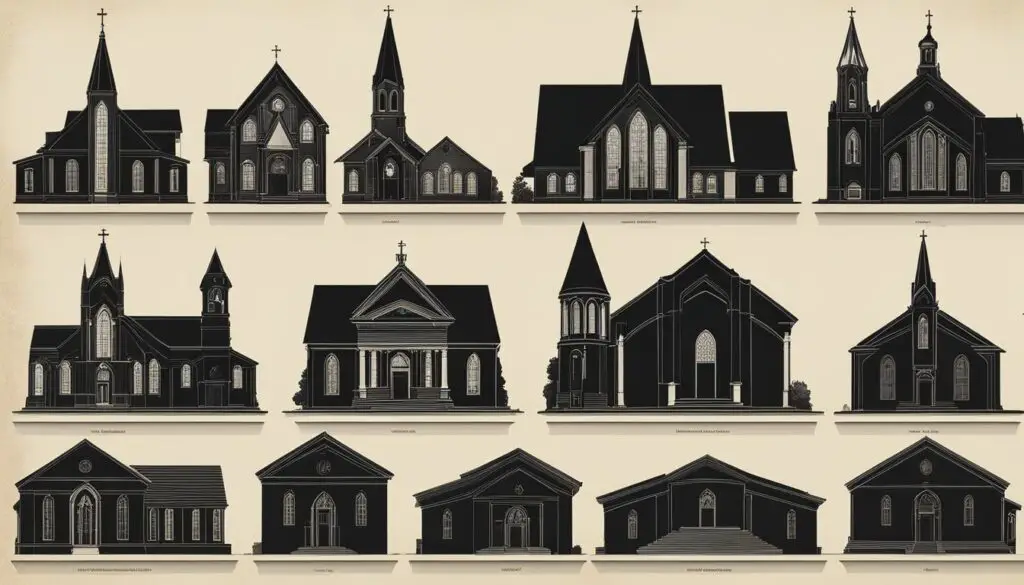
The Changing Role of the Black Church
- Origins in slavery as a sanctuary and spiritual refuge
- Evolution into a center of activism during the Civil Rights Movement
- Addressing contemporary challenges faced by African American communities
The Transformation of the Black Church
“The Black Church has adapted and transformed over time, embracing social and political roles while remaining rooted in its core values and traditions.”
Denominational Splits and Schisms
- Resulted from theological differences and disagreements over leadership and governance
- Reflects the diversity of African American religious traditions within the Black Church
- Highlights the ability of the Black Church to embrace differing viewpoints and adapt to change
Conclusion
The history of the Black Church is a testament to the rich heritage of African American religious traditions. From its origins in the trans-Atlantic slave trade to its enduring influence in modern society, the Black Church has played a crucial role in shaping the religious, social, and political landscape of America. It is a symbol of faith, resilience, and community that continues to inspire generations.
The Black Church has weathered countless challenges throughout history, from slavery and Jim Crow laws to the fight for civil rights. Despite these obstacles, it has remained a source of hope, empowerment, and collective action for African American communities. The Black Church stands as a beacon of light in the face of adversity, addressing contemporary issues such as systemic racism, poverty, and healthcare disparities.
The legacy of the Black Church extends far beyond its religious significance. It has been at the forefront of the Civil Rights Movement, with influential leaders like Martin Luther King Jr., Rosa Parks, and Ralph Abernathy emerging from its ranks. The Black Church’s commitment to social justice and equality has left an indelible mark on American history and continues to inspire movements for change.
As the Black Church evolves and adapts to meet the changing needs of African American communities, it remains rooted in its core values and traditions. Its influence and impact can be felt not only within the African American population but also in the broader American society. The Black Church is a testament to the enduring spirit of African American religious heritage and its lasting legacy in shaping the fabric of our nation.
FAQ
What is the history of the Black Church in America?
The Black Church has a 400-year-old history that traces back to the African American community’s arrival in the New World. It evolved from the faith traditions brought from Africa and became a unique form of Christianity.
How did the Black Church survive the challenges of slavery?
Enslaved Africans preserved and adapted their faith practices during slavery, using the Black Church as a space for worship and community-building despite the hardships they faced.
What are the key beliefs of the Black Church?
The Black Church emphasizes communal worship, spiritual healing, and social justice. It blends elements of African spirituality with Christian teachings, emphasizing faith, prayer, the presence of the Holy Spirit, and the liberation of the oppressed.
What role has the Black Church played in American history?
The Black Church has been a symbol of faith, resilience, and community. It has served as a source of strength and empowerment for African Americans, played a vital role in civil rights movements, and addressed social issues such as poverty, education, and systemic racism.
Are there divisions within the Black Church?
Yes, the Black Church is composed of various denominations and independent congregations. Divisions and schisms have occurred over time due to theological differences or disagreements over leadership and governance.
Who leads the Black Church?
The Black Church is led by pastors and ministers who guide their congregations spiritually. The leadership structure varies among denominations and churches, often involving a combination of clergy and laity leadership.
What is worship like in the Black Church?
Worship in the Black Church is characterized by vibrant expressions of faith, including energetic music, passionate preaching, and active participation from the congregation. Music, such as gospel, spirituals, and hymns, plays a central role in the worship experience.
How does the Black Church influence contemporary society?
The Black Church remains a center for spirituality, community organizing, and social services. It addresses contemporary issues faced by African Americans, such as poverty, education, healthcare disparities, and systemic racism, providing hope, empowerment, and collective action.
How many members does the Black Church have?
The exact number of worldwide Black Church members is difficult to determine due to the variety of denominations and congregations. However, it represents a significant percentage of the overall African American religious population.
What role did the Black Church play in the Civil Rights Movement?
Black Church leaders, including Martin Luther King Jr., Rosa Parks, and Ralph Abernathy, were at the forefront of the Civil Rights Movement. They advocated for racial equality, voting rights, and an end to segregation, using the Black Church as a space for organizing and inspiring change.
How has the Black Church evolved over time?
The Black Church has adapted to meet the changing needs of African American communities throughout history. It has navigated through challenges such as slavery, Jim Crow laws, and the fight for civil rights. Today, it remains a resilient institution addressing contemporary issues while staying rooted in its core values.

